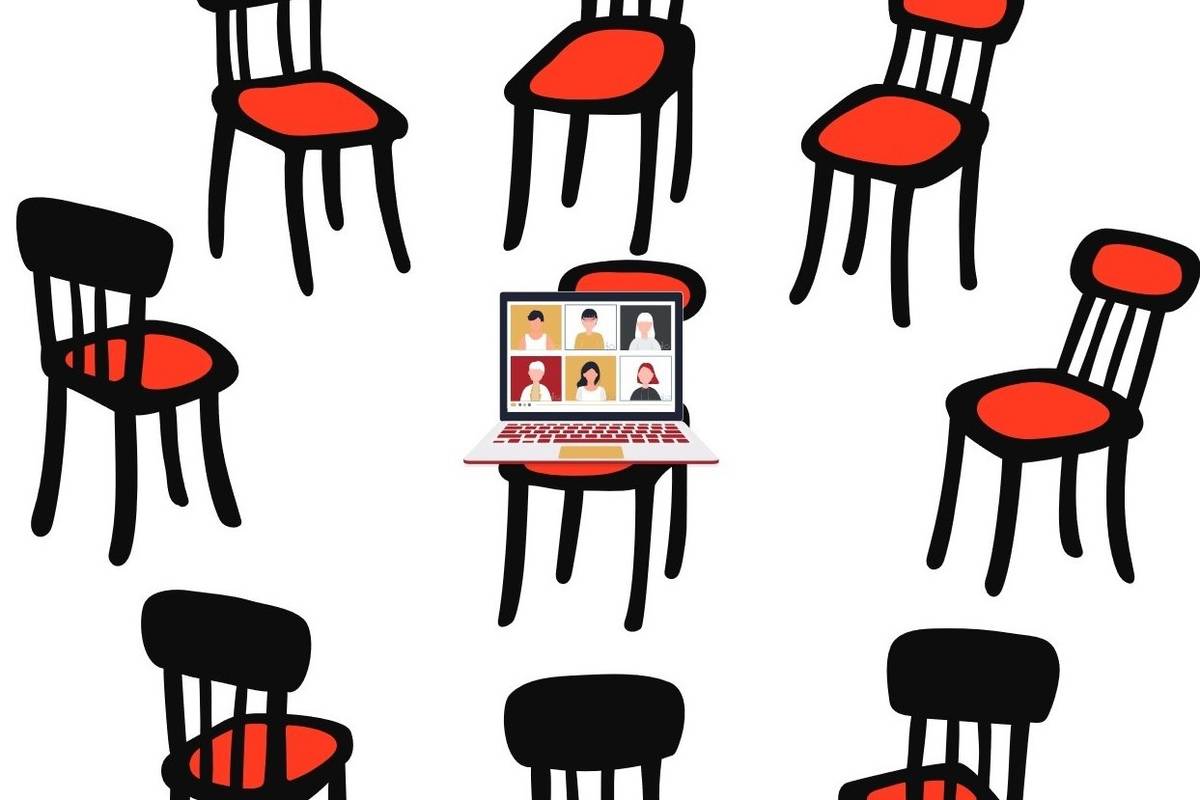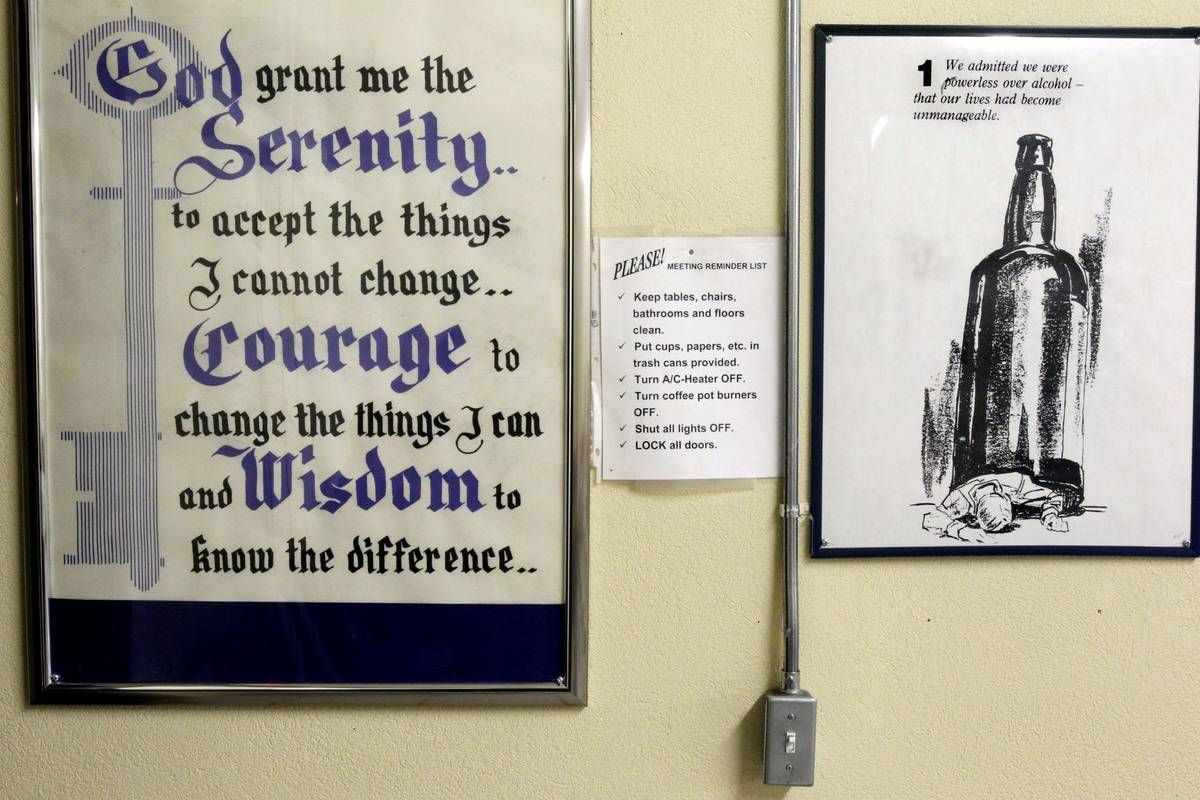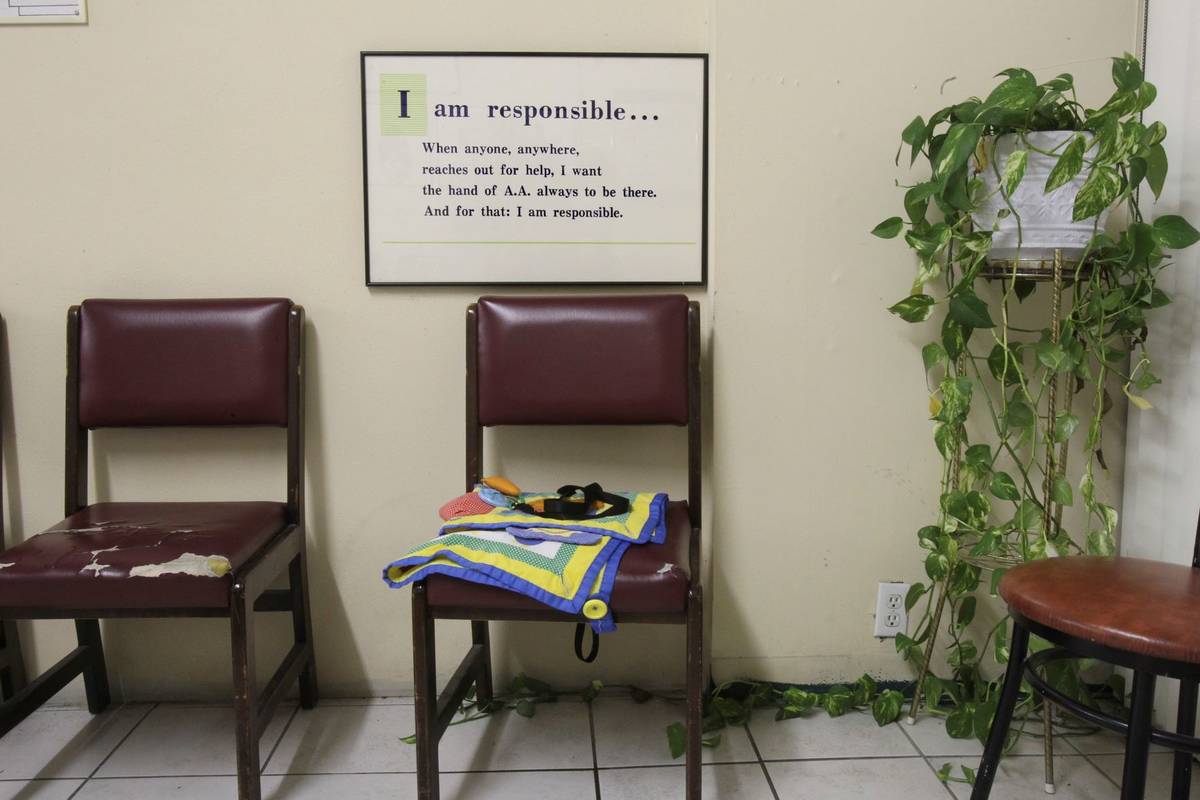Las Vegas AA meetings take on new look during pandemic
It’s the simple, casual interaction — the chats, the hugs, the certainty of seeing a friend — that Jane misses most.
Jane has been a member of Alcoholics Anonymous for almost 33 years. She last went to an AA meeting at the start of the COVID-19 pandemic but felt uncomfortable there because of a lack of mask-wearing and social distancing. So, she’s been participating only in virtual meetings since then, forgoing hugs but thankful that an alternative exists.
Nearly a year into the pandemic, AA members in Southern Nevada are as likely to be attending virtual meetings as live ones. And while live meetings are returning, what began as a pandemic-prompted alternative may remain as a recovery tool even after the pandemic ends.
Keeping connected
Jane had been attending live AA meetings four or five times weekly. (She and other recovering alcoholics in this story are identified solely by first names, since a guiding principle of AA is anonymity.) When the pandemic forced her to stop, “I’d tell myself, ‘You’ve got this. You’re 32 years sober. You’re not going to drink. You’ll be fine.’ ”
A few weeks later, Jane was watching a TV show and saw someone “pouring a glass of wine or a drink, like they do in every show you watch, and it came over me. It was unbelievable. All of a sudden, (having a drink) became such a good idea.
“I’d never experienced that before. I hadn’t thought of drinking in 25 years. So, I set my alarm and went to my first Zoom meeting the next day, and I’ve been doing it ever since.”
Jane considers Zoom meetings a good, hopefully temporary, alternative but said, “I miss getting hugs and seeing my friends.”
Key element
Meeting regularly with others who share the same battle with addiction is a key element of Alcoholics Anonymous and other 12-step groups that have adopted the AA model for such issues as narcotics abuse and compulsive gambling.
Meetings offer “a degree of active support from other people who could understand what individuals are going through,” said Dr. Michael Levy, founder and medical director of the Center for Addiction Medicine.
Donna Wilburn, a Las Vegas licensed marriage and family therapist, said meeting with others promotes support and accountability. “A lot of these folks don’t have support in their lives, people who are supporting healthy decisions. And accountability is someone there to help keep you on track with how you’re doing.”
But, when the pandemic arrived, in-person meetings were “disrupted,” Levy said, leaving in place “isolation and a lack of socialization.”
Live meetings never completely disappeared, said John, an AA member and public information chair for AA in Las Vegas. He estimates that at the pandemic’s start, about 1 percent of meetings held each week in the Las Vegas Valley continued to meet in person.
Then, “out of nowhere, within a few weeks, everybody went to Zoom.”
Going virtual
Diane has been in AA for about five years and also didn’t feel comfortable attending live meetings. It took her about a week to find a virtual meeting to attend.
“I know that doesn’t sound like a long time, but for me it felt like forever,” she said.
Diane felt “skeptical and a little uncomfortable at first” but found the camaraderie of a virtual meeting close enough to that of a live meeting. She now attends Zoom meetings several days a week and facilitates one Zoom meeting weekly.
Its not entirely the same, she said. For example, at one point during meetings, participants join hands to say a prayer.
“That’s a very powerful feeling. Everybody is in the room holding hands and saying it together,” she said. “But I still feel a connection on Zoom.”
“I think one of the things we have learned about recovery is those relationships and those connections really do make a difference,” said Jody Marshall, clinical director at Community Counseling Center of Southern Nevada. “Having those connections, whether it’s a 12-step group or your own support network … are really important.”
Marshall doesn’t think that live and virtual meetings are “equally effective. Look at face-to-face (conversation) versus a phone. A lot gets lost with the virtual. But it’s better than not, and you’re still … getting some connection.”
Shane Kraus, an assistant professor of psychology and director of UNLV’s Behavioral Addictions Lab, said there’s little research to compare the relative effectiveness of live and virtual 12-step meetings.
“We know technology can help facilitate some sorts of social connection, so why shouldn’t (virtual meetings) be happening?” he said. However, “its efficacy is something we don’t know.”
“Some people prefer (virtual meetings), but a lot of people don’t,” said John, who participates in two live and three virtual meetings weekly. “When everything is allowed to open back up and everybody is vaccinated, I guarantee you everybody is going to be back in meeting rooms.”
Falling away?
It’s also not certain whether the move to virtual meetings caused some AA members to fall away. AA doesn’t keep attendance records, but Bill, a member who chairs the AA Las Vegas central office’s hotline committee, estimated that the local AA hotline has received 25 percent to 30 percent more calls during the pandemic.
“A lot of it is people trying to find out if meetings are live yet,” Bill said, and “there are always, pandemic or not, the crisis calls as well,” although the number of those hasn’t been “much different than it is normally.”
“A lot of people are calling, a lot of times, who just wanted to talk to somebody,” Bill said.
Dave, who has been in AA for 15 years, knows of several members — including “a lot of 30- and 40-year sober guys” — who have left. He’s also noticed that newer members are “more receptive to going to in-person meetings.”
John knows of members who stopped participating in meetings. “Did the lack of in-person meetings contribute? I can’t say,” he said.
He thinks of one member “who went out that surprised me. I couldn’t tell you if it was because of a lack of in-person meetings or in his head he (was) always premeditated and looking for an excuse to do it because the one thing that alcoholics love more than anything in the world is excuses.”
Jane also knows of a few people who no longer attend meetings. “I don’t think that’s pandemic-related,” she said. “That’s just my opinion. I think people were not ready.”
“The people I know who relapsed, it’s not because ‘I can’t go to a meeting, so I decided to drink,’ ” Diane said. “I never heard anyone say that.”
Another option
Bill estimates that 10 to 20 percent of meetings that converted to Zoom meetings last year have returned to meeting live, most of them employing a hybrid model that combines live participants with a Zoom feed.
But, he added, “closer to 80 percent or even higher are definitely just doing Zoom.”
“I don’t think Zoom should take the place of live meetings,” Diane said. “There’s something about having to go. It’s part of the journey, part of facing your fears and being with a group of people.”
Bill expects virtual meetings to continue as an option for members, even though “you’re going to have people like myself who prefer to be in a live meeting.”
For now, Jane will attend only virtual meetings. She has received her first dose of the COVID-19 vaccine and said she may feel more comfortable returning to live meetings after the second.
She keeps up with fellow members through virtual visits before or after virtual meetings, phone calls or text messages, but still misses “just seeing all my friends and the hugs and the personal contact.”
“That’s hard,” Jane said. “But I don’t have to drink over it.”
Contact John Przybys at jprzybys@reviewjournal.com. Follow @JJPrzybys on Twitter.
LEARN MORE
For more information about Alcoholics Anonymous, visit the Las Vegas Central Office for Alcoholics Anonymous. The page includes a schedule of AA meetings around the Las Vegas Valley.
lvcentraloffice.org
Some meetings remain closed because of COVID-19, so it's recommended that callers contact the office's 24/7 hotline to find in-person meetings. 702-598-1888
vegasfob.com
AA meeting directory Vegas Friends of Bill W. lists area meetings and offers links to AA literature.





















